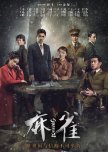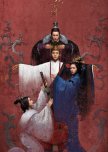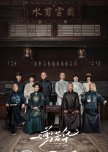
Min Guo Da Zhen Tan
27 oamenii au considerat această recenzie utilă
All style no substance.
I was really excited to watch this Republican period detective drama. Having enjoyed Hu Yitian and Zhang Yunlong's chemistry in My Roommate is A Detective, I couldn't wait to see them team up again in a similar setting. The adaptation of Agatha Christie's Poirot mysteries seemed like an added bonus. Sad to say, despite the visually sumptuous set and costumes, both the characters and cases are bland, uninspired and the pacing is very draggy.While Situ Yan is the lead detective, he is not meant to be a literal adaptation of Hercule Poirot. Poirot with his known eccentricities including his fastidiousness and obsession with symmetry, is one of the the most distinctive, well dimensioned fictional detectives ever. He has a clear process and methodology that is based on human nature and psychology for solving the case. I would never cast Hu Yitian as Poirot and I am ok with the fact that Situ Yan is not Poirot. What I am not ok with is the colorless, cardboard characterisation of Situ Yan as simply a highly intelligent but rather lethargic lawyer with a strong sense of justice. Hu Yitian does his best with the role but he doesn't have much to work with. This is made worse by Luo Shaochuan, the money guy whose contribution to the crime solving aspects of the partnership is unclear. This character is so indifferently written it is not worthy of an actor of Zhang Yunlong's calibre. The two leads get little screen time together as they go down disparate paths in the investigations. Unlike their previous best loved collaboration, Zhou Mowan is more often Situ Yan's sidekick than Luo Shaochuan is. Thus we don't get to enjoy their banter and their incredible chemistry that builds up and fleshes out both characters as they work through the cases. While both female leads are well written and likeable, they crowd out the bromance.
When it comes to adapting these beloved Poirot classics, I am no die-hard Christie purist. I am receptive to and have seen good adaptations that take a fair amount of liberties with the original works. This can be successfully achieved because changes notwithstanding, the adaptation remains true to the essence of Christie; the psychology of the crime. This is where Checkmate fails to deliver. The supporting cast is very mediocre and lacks screen presence. Bland storytelling and poor pacing with unnecessary romantic digressions disrupts the build up in suspenseful tension into the final reveals. The cases must be evaluated convincingly from the point of view of each character, to assess their psychology as a sense of imminent peril escalates. Who was the victim? Why would someone want them dead? Who would cross that line and actually do the dastardly deed? This drama fails to make me feel invested in the human aspects - the victims and potential suspects; it fails to create a sense of urgency to solve the case or engender that mixture of sorrow, pity and revulsion for the perpetrator that is signature Christie.
The first case is Murder on the Orient Express, a well known case that has been adapted to death. While this version does not stand out, it stays close to the original and is fairly well done. Although Roger Ackroyd is also quite well done considering how difficult it is to adapt an unreliable narrator case into this format, from there, things start to go downhill. These cases are masterpieces; material changes should be weighed carefully and not made with the misguided idea that such impeccable Christie plots have scope for improvement or merely for the sake of delivering a surprise twist. Which is what they did to one of my personal favourites. They went for the plausible alternative solution which simply did not fit the human nature aspects of the case. And thus fails to deliver Christie's magic wow factor, the thrill and the chill and that sense of shock, sorrow and acceptance that it all made sense; that it is the best and only solution. It devolves further as cases are stitched together in a cut and paste fashion that is increasingly incoherent. The final case bears little resemblance to what I think must be the original. While it took no genius to spot the the final antagonists a mile away, their motives are uninteresting and unconvincing and the ending is frankly farcical.
If you are a Christie purist, I would say avoid this drama. You will feel they have desecrated some of the author's best works. If not, this is a watchable if unexceptional adaptation. The production values are quite good and the Republican period setting in Harbin has some novelty appeal even though the drama overall is all style no substance. This is a 7.0 for me but I would have rated it 7.5 if they didn't ruin Five Little Pigs and finish in such an absurd manner.
Considerați utilă această recenzie?

The enemy of my enemy is my friend.
This is the spy thriller that I will compare all other Republican period spy thrillers to going forward. It is that good. Each of the engrossing 61 episodes just flew by and I haven't been able to watch anything else since. I put this off for a long time due to poor reviews of the female lead's performance, which unfortunately is beyond dreadful. The rest of the cast however, is so phenomenal that they more than make up for it, to the point that the rating simply does not do justice to this drama.Set in 1940s Shanghai during the Wang Regime (Japanese puppet government), Chen Shen works for his best friend Bi Zhongliang who heads up the Special Operations Division. At surface, he is an indolent playboy, an aspiring barber until he was propelled into a position of favor and authority for saving Bi Zhongliang's life. In reality, he is a double agent loyal to the CPC. Things get complicated when his former student and true love Xu Bicheng and her husband Tang Shanhai are assigned to the Special Operations Division. The paranoid Bi Zhongliang eyes them with suspicion because Bicheng is his superior and rival Li Moqun's niece. He is already under growing pressure from both Li Moqun and their ultimate superiors, the Japanese for failing to capture the notorious communist spy Sparrow.
The overarching plot of this drama is rather simple and clean. The main communist and nationalist protagonists have just one mission; to steal the Return to Zero plan hidden within the Special Operations Division. The antagonists are aware of this and use this knowledge to try to trap them into revealing themselves and to capture Sparrow. The subplots and unpredictable way the storyline unravels with many twists along the way are largely driven by the characters as they react to stressful life and death situations that force perilous split second decisions. One of the weaknesses in storytelling is that the writers resort to coincidences and sheer luck a little bit too often to facilitate twists or bail the main protagonists out of tricky situations. Nonetheless it all comes together to deliver an intense aura of suspense that builds towards the thrill of unexpected victories, shocking betrayals, blindsiding plot twists and sudden death.
Chen Shen is the perfect spook - he is on the one hand an innocuous ladies man; a charming, stylish teetotaler who can't even bring himself to fire a gun. Yet he manipulates Bi Zhongliang masterfully; ruthlessly stoking and soothing his insecurities at the same time. This is by far the most fascinating relationship in the drama. Although he mistrusts Chen Shen, Bi Zhongliang is also touchingly sincere and protective of him. Chen Shen's feelings towards him are complex; they have an unusual bromance that pulls them together regardless of the fact they are on opposite sides. Chen Shen is not only the most intriguing character in the drama, he is also considerably more ruthless and manipulative than the main antagonists. This is by far Li Yifeng's most memorable role to date, well complemented by Zhang Luyi's disarming portrayal of Bi Zhongliang. The dialogue is sophisticated, pointed, witty and laced with sarcasm and dark humor that often relieves suspenseful tension with laugh out loud moments and encapsulates the complex character dynamics.
Even though I am a huge sucker for morally ambiguous characters like Chen Shen, there are almost too many moments where Zhang Ruoyan's Tang Shanhai eclipses him. And it is not just because he looks so incredibly scrumptious in a suit. Too often the second male lead is dumbed down to elevate the male lead. While it is true that Tang Shanhai is not quite the consummate spy that Chen Shen is, Zhang Ruoyun pulls this off without portraying Tang Shanhai as less intelligent; just a tad less ruthless, a tad less composed and a lot more heart. He is thrust into many parallel situations with Chen Shen but the way he processes and reacts to the situation, how he is clumsier at manipulation, how his remorse is more visible; makes it clear that he is a less hardened spy. His relationship with Chen Shen evolves from rivalry and distrust into mutual respect and a grudging friendship that compels the two to work together when their interests align. The enemy of my enemy is my friend is a recurring motivator in this drama that pits multiple characters alternately with and against each other.
The female lead, Xu Bicheng is by far the drama's weakest link. Unlike many, I don't think the writing is the problem; on the contrary I find the character to be one of the best written, most complex female roles out there. Bicheng is a flawed character; stubborn to the point of recklessness with a bleeding heart for lost causes who wears her heart on her sleeve. She is also often underestimated, can be very cunning, is a fantastic liar when cornered and is able to manipulate both Chen Shen, Tang Shanhai and Tao Dachun into doing what she wants and her character undergoes tremendous growth. None of these positive aspects are conveyed by the acting because Zhou Dongyu is a very limited actress who just lazily recycles the same four boring, mopey, terrified and pitiful expressions throughout the drama. The only things she does well is child ugly cry and child uninhibited smile from the heart. Which is wonderful... if she were playing a child. In this role, it is at odds with the role of a woman in her mid twenties, a spy and a married woman for crying out loud. It is also obvious no one ever told her it does not suit her naturally rather mature facial features and incredibly grown up styling in this drama. She fails so badly at projecting that je ne said quoi that has every man fall in love with her that its not even fitting to call her a Mary Sue even though she does need constant rescuing. I could not empathize with her at all and couldn't care less what happens to her.
Kan Qingzi was robbed - her Li Xiaonan stole the show and she really deserves top billing as female lead in this show. Her performance puts Zhou Dongyu's to shame even though the character is at surface, less complex and interesting. I normally loathe ditzy, lame characters like Li Xiaonan who are capable of loving wholeheartedly even when it is not reciprocated. But wow, she made me laugh, she made me cry, she made me respect her single-mindedness, I was 100 percent behind her. And that is what a good actor does, it is what every actor in this exceptional cast other than Zhou Dongyu managed to do - impress me with their acting and make me empathize with them even when they play dark or weak characters. Geez even Yin Zheng or especially Yin Zheng managed to make me empathize with his portrayal of the rabid, vicious, cruel and dangerous Su Sanxing.
A criticism of this drama is that love seems to have overshadowed the spy story; that the unrequited love trope is perhaps overused in this drama. While there is some truth to that, this is still very much a spy thriller that is chock full of excellent twists and turns. And the bigger point is that the unrequited love trope is used brilliantly to explore how each of the main characters bestows and responds to unrequited love in completely different ways. I normally approach Republican dramas with a stone cold heart - I go in pretty much expecting everyone to die it is just par for the course. In this one, too many characters still managed to steal my heart and made me bawl my eyes out. That said, the drama ends very fittingly after the final showdown.
My favorite line in the drama is Chen Shen's heartfelt "Please... don't tell anyone you were my student." This is by far the best Chinese spy thriller I have seen to date (August 2021). This is a 9.0 for me but I could easily rate it 9.5 were it not for the appalling execution of the female lead role.
Considerați utilă această recenzie?

Imperfect Victim
23 oamenii au considerat această recenzie utilă
Această recenzie poate conține spoilere
Just Say No.
This is not an easy drama to watch. It shines an unflinching spotlight on the unchecked, oppressive soft power of the uber rich and how society and by extension the legal system holds victims to an impossible standard of perfection. The narrative opens with a married, high powered CEO Cheng Gong caught in flagrante delicto with his assistant Zhao Xun, after an inebriated night of corporate entertainment. The media is at the scene and a full blown scandal ensues with dire consequences for both parties. Cheng Gong's team of fixers led by his relentless public relations executive Li Yi and a sharp lawyer Lin Kan swoop in immediately to understand and contain the situation.As the facts emerge, it becomes clear that Cheng Gong and Zhao Xun remember the night very differently and the situation devolves quickly into "he said she said". Zhao Xun is a mass of contradictions who struggles to understand her own version of the truth, which obviously does not square with Cheng Gong's. Both parties are victims that are damaged by the fallout and they each believe in their own version of the truth, which the drama explores in a very balanced way. The key question is does silence mean consent? This should be straightforward - she can just say no. She could have and should have done just that. Lin Yun delivers a heartbreakingly convincing articulation of just how difficult, near impossible it is for someone in Zhao Xun's position to do that in the face of the massively uneven power dynamics between herself and Cheng Gong. Her downfall was foreshadowed long before her failure to speak up at the point of no return. She was doomed from the moment he saw her, wanted her and tempted her with fast advancement, the material trappings of wealth and the heady mix of the power of the executive suite. She was complicit and she loathed herself for it. Yet I felt real sorry for her and I understood why she felt wronged. While most praise Zhou Xun's portrayal of Lin Kan, for me Lin Yun as Zhao Xun was the outstanding performance. She made me deeply empathise with this young, flawed, inconsistent, movingly vulnerable and imperfectly human character that struggles to find her voice.
Even though Liu Yijun always delivers, he takes it to the next level with his mesmerising portrayal of a sociopathic like Cheng Gong who believes that everyone has a price and how ruthlessly and manipulatively he wields his power to get his way. His sense of entitlement, utter lack of self awareness and inability to grasp how disconnected he is from common humanity and decency is scary and pathetic. As for Zhou Xun, her Lin Kan is a shark with a bottom line. Her skilled probing questions delivered with a sharp, liquid and searching gaze and her calm, dispassionate and and incisive legal analysis enunciated in her deep, rich and deliberate voice is superb. Her mature, confident beauty and elegant and nuanced empathic line delivery has taken viewers by storm. Only a phenomenal veteran cast like this can deliver such convincing, multi-faceted and realistic portrayals.
The drama's strongest arc is the opening - it made me very sad and very, very angry at pretty much every main character. This kind of story however is difficult to end in a good and realistic way. I think this would be a better if it were shorter as the drama's core message that women need to find their voice and that an imperfect victim is still a victim hits home early on. I didn't think Lin Kan's "Me Too" arc is necessary and it doesn't quite come off the right way how a stronger character succumbs to the same temptations yet manages to emerge largely unscathed albeit scarred nonetheless. I also don't like how Lin Kan is written overall notwithstanding Zhou Xun's charismatic acting. It would have been better if Lin Kan chose sides early in the game and was pitted against Li Yi or her mentor early on rather than making her all things to all people. This results in too many conflicts of interest that are just glossed over. Despite her alleged bottom line, Lin Kan appears unscrupulous in how close she gets to Zhao Xun. It is also not realistic that Zhao Xun never seeks her own legal advice. Finally, the way Lin Kan prevails using information she obtained while acting for the other side is just plain wrong and practically impossible.
The drama literally and figuratively goes off a cliff in a way that makes the last third of it a less convincing watch. It doesn't make sense that a smart and manipulative character like Cheng Gong continues to go persecute Zhao Xun after she becomes so wretched and pitiful. It is just a contrived way to force an ending message that in China, even imperfect victims can find their voice via the justice system. My biggest issue with the story however is that the worst, most vile character is a woman who enabled Cheng Gong and victimised Zhao Xun just as much if not more. She shows no remorse and there are no true consequences for her. This aspect of the ending deeply disappointed me; I needed to see her confronted and at least punched in the face! Despite her superb visual composition style, storytelling wise Yang Yang proves once again her inability to wrap up the narrative while she is ahead. Nonetheless, the first half or so of this drama tackles some heartbreaking and controversial issues masterfully and is worthy of an 8.5. Unfortunately the writing doesn't hold up and it nosedives into an 8.0 towards the end and that is my overall rating. It is still worth watching when you are in the mood for a thought provoking drama that closely resembles a recent real case with all around amazing acting.
Considerați utilă această recenzie?

Secret of Three Kingdoms
23 oamenii au considerat această recenzie utilă
Sleeping with the enemy.
This drama weaves some of the most prominent historical figures of China's Three Kingdoms period into a fabulous and exciting tale of intrigue, adventure, and romance reminiscent of a Dumas plot. This is a highly fictionalized yet disarmingly convincing exploration of the motives and relationships of the key figures of the day that manages to stay broadly true to history.The last Han emperor has a secret that could shake the foundations of the empire and shatter his tenuous hold on power. Aided by a small intimate circle that includes the empress, his boyhood friend Sima Yi and a dwindling number of old Han ministers, he embarks on a desperate quest to escape the clutches of Cao Cao and restore the glory and power of the Han empire. But the cruel strategies and sacrifices needed are at odds with his benevolent nature and inclination to show mercy to his enemies. Ma Tianyu impressively pulls off a complex portrayal of this seemingly weak and powerless emperor who frustratingly sticks to his guns against all odds to ultimately succeed in winning the hearts and minds of his enemies with his enlightenment and magnanimity. It is very clear that the emperor and the notorious Cao Cao have very similar world visions and goals but their methods are extreme opposites - one rules by fear and sheer brute force while the other kills you with his kindness. Both are pragmatic and when the rubber meets the road, have little choice but to sleep with the enemy in order to achieve the outcomes they are after. We get to decide for ourselves who was more effective, who really won their epic struggle for power and whether it was worth it.
There are no real villains in this drama - even the emperor's enemies are portrayed in a very balanced manner though it is fair to say that the so called villains out-acted the heroes. Guo Jia is my favorite character in the drama - I often found myself rooting for him and oddly moved by his and Cao Cao's loyalty and affection for each other. And Tse Kwanho's Cao Cao must be by far the best Cao Cao I have ever seen - so cunning, powerful and menacing I was actually scared of him. Some of the most gripping and intense scenes in this drama are when Cao Cao and the emperor go toe to toe. My one big criticism of this drama is Han Dongjun's Sima Yi is shallow, boastful and unemphatic. For a highly rated actor to miss the mark on such a key character is just not acceptable. While some of the bromance moments with the emperor are decent, most of the time he is not in character and does not convincingly pull off the legendary strategist. Cao Pi is also extremely well acted but overshadowed by all the other outstanding performances. There is quite a bit of sizzling romance this drama, notably that of the emperor and empress as well as Guo Jia's but Sima Yi's was just kind of flat.
This drama is full of suspenseful moments and action as danger lurks around every corner. The second arc however is a bit draggy and requires some suspension of disbelief but that is also where the awesome Guo Jia emerges so don't abandon it there.
I will stop here and keep this short as it would be a crying shame to spoil this one. I highly recommend this very enjoyable and under appreciated drama that I would rate higher if not for Sima Yi
Considerați utilă această recenzie?

Love Like the Galaxy: Part 2
47 oamenii au considerat această recenzie utilă
Birds of a feather.
The second part of Love Like the Galaxy 月升沧海 (The Moon Rises over the Ocean) is shades darker as Cheng Shaoshang struggles to open her heart and mind while Ling Buyi's secrets and inner demons are revealed. Their romance plays out in the bosom of the royal family, where Shaoshang blossoms under Empress Xuan's affection and tutelage. This subjects our golden couple to much envy and political intrigue.Shaoshang of Part 1 is disappointingly over empathetic and likeable. Shaoshang of Part 2 is immature and frustrating to the point of being dislikeable, This is exactly how she is meant to be depicted and the portrayal I was waiting for. So I must applaud Zhao Lusi for so daringly rendering Shaoshang as a difficult, often petty, unforgiving, vengeful child woman who wallows most unbecomingly in self pity. As an unloved child, Shaoshang is terrified of love. While she tries to figure out what she wants in a partner, she puts up all kinds of walls and clings to any excuse to not allow Ling Buyi in. She is her own worst enemy, fighting happiness every step of the way. Ling Buyi's infinite patience and indulgence of her is so hot anyone else would have succumbed to raging hormones in short order. Not Shaoshang though. She knows her worth and digs in her heels to demand to be an equal partner in every sense and meaning of that term. While highly usual for a woman of that time, it resonates with modern audiences for obvious reasons.
There aren't really good villains in this drama. That is because Ling Buyi is such a chilling character that he is already as close to a villain as can be. He is a man with a secret, one whose entire raison détre is to uncover the master mind behind the Gu City massacre and to avenge the Huo clan. He did not expect to fall for anyone and certainly not Shaoshang. He meant it when he said they were on different paths. On many occasions he merely eases her way with the intent of letting her go but never quite succeeds. He loves her selflessly and indulges her worst instincts, especially her vengefulness. Hence Yuan Shen's blinding epiphany that Buyi and Shaoshang are birds of a feather. They are rebellious and vengeful eye for an eye kind of people who can't tell the difference between a chicken and a duck. They are also at surface cold, unforgiving even selfish but in truth feel deeply. I find Wu Lei's acting in Part 2 more natural and compelling. He is such a patient, warm and tender person but only for Shaoshang. This is utterly different from the cold-hearted, calculating general who is a borderline psychopathic killer to his enemies. Wu Lei's combat scenes are simply the best. The aesthetic camera angles and gorgeous choreography brilliantly captures his stunning athleticism and graphic, muscular, ferocity that is capable of mowing down an entire battalion.
For me, Empress Xuan is the true hero of this story. As much as I enjoyed Buyi and Shaoshang's journey, it is her story and that of Wen-di and Consort Yue that I find so much more complex and moving. Told with epigrammatic dark humor that dulls the edges of their pain and sacrifice, they are nonetheless imprisoned by values that are bigger than themselves. While Consort Yue lashes out with wit and acerbity, Empress Xuan suffers in dignified silence. Do not be angry with Shaoshang for finding it so difficult to forgive Buyi. Although his cause is just and the outcome serves the greater good, it cost Empress Xuan everything. Shaoshang's first unselfish, grown up act is to accompany her, to atone for what Buyi did and for how she unknowingly helped him. That is what devastates her as much as Buyi reneging on his promise to her. Buyi knows and understands this. Without Empress Xuan's forgiveness and generosity of spirit, they may not have found a way to forgive themselves and each other. Her love is truly like the galaxy in its vastness and selflessness. The galaxy owes it to her to make sure she and Wen-di do not meet again.
In terms of storytelling, very much like Part 1, Part 2 wastes too much time on too many delusional love sick women who conspire against the lovers. This comes at the cost of the storytelling. which towards the end suffers from heavy cuts and sloppy editing. As a result, characters like Lou Ben and Tian Shuo are not properly fleshed out and I did not feel that invested in either the Peng Kun or Guo Village arcs, which feel rushed. When they could have simply omitted both the Fifth Princess and Luo Ji Tong's arcs which were superfluous to the plot. It also underscores how nasty, dumb and divorced from reality the vast majority of the women in this drama are. I really do not like this type of misogynistic and cynical depiction of womenkind. Even though the ending is very satisfying, especially when it comes to the character stories, the unfolding of the plot which we waited way too long for is not well done. Considering the stunning production values, it is a shame if they do not go back and re-edit it with some of the cut footage into a Director's Cut.
All things considered, I enjoyed this beautifully written drama immensely. I find Part 2 slightly better than Part 1 and am pleased to rate the drama in its entirety and Part 2 on a standalone basis a 9.0, better than my 8.5 rating for Part 1 by itself.
Considerați utilă această recenzie?

The Master of Cheongsam
19 oamenii au considerat această recenzie utilă
A cut above.
This is a wonderfully produced drama that deserves a lot more attention. It is a riveting tale of sibling rivalry that spans a time of rapid change and turbulence in modern Chinese history. Jiang Mosheng and Lu Yuanzhi are both adopted and apprenticed by Master Su Jingan of Sancai (Triple Cut) House, couturier of the Qing Imperial Court. Sancai House routinely outshines other rival houses in the workmanship, symbolism and design of the intricate ornamentation of the Dowager Empress' court robes, allegedly due to their seamless stitch, a tradecraft that is passed down from one generation to another. Master Su's most bitter rival is his former fellow apprentice, Master Bai Henian of Sihe House.Jiang Mosheng is the older, steady, responsible brother and heir apparent, whose great talent is meaningfully enhanced by his passion and dedication. Lu Yuanzhi is the hot headed, audacious and visionary brother; a rare talent whose brilliance is nothing short of genius. His recklessness however lands him in serious trouble. To save him, Mosheng cuts ties with Sancai House, defects to Sihe House and accepts Master Bai as his foster father. This sets the brothers down a complicated path of reluctant rivalry, conflicting loyalties, mutual friendships, convenient alliances, mistrust, betrayal and forgiveness. The most prominent feature of this drama is the Abel and Cain relationship between the brothers and it is well written, consistent and riveting. Both of them are flawed characters and neither is completely blameless for how things play out between them. Although Yuanzhi learns to rein in his recklessness and temper as he matures, it still manages to get the better of him. His culpability over Mosheng's sacrifice constantly lingers in the air between them. Even though he can be such an ass, I have to sympathise with Mosheng's battle with his own worst instincts in the shadow of someone who is perpetually a cut above. Both Zhang Haowei and Hong Yao delivered excellent, empathetic performances, alternately frustrating, enraging and beguiling me at all the right moments.
How the design of the cheongsam or qipao evolves to reflect the changing attitudes of times is the main, fascinating centrepiece of the drama. While not in the same league as the more modern and sophisticated qipaos of Wong Kar Wai's iconic In The Mood for Love, all of the outfits from the Qing court robes to the Western flapper dresses are simply gorgeous and I truly enjoyed the mini history of Chinese costume. How the female characters are dressed is also symbolic of who they are - Yaoyao is a remnant of the past at sharp contrast with Lijun, the ultimate, progressive modern woman. Kang Ning sits in the middle - she embraces change in a way that marries it with tradition; and thus she is truly Yuanzhi's muse. True to character, both Kang Ning and Lijun have a very refreshing attitude towards relationships and love that I truly enjoy and they fight to write their own stories even when events conspire against them. The only character I didn't like is Yaoyao who is your typical c-drama archetype but she is written that way as a foil for the other two. There are enough dimensional, grey and consequential characters in this drama that I am very satisfied with the character aspects of it. Most of these key roles are performed by veteran actors whose acting often surpasses the quality of the dialogue. I laughed my head off at the dynamics between Lijun, Feiyu and her father.
This is largely a character driven drama where the main characters have to cope with the changing times as they transition from the Qing era to the Republican era and Japanese incursion. While the pace is fast with many exciting and unexpected turns along the way, not all of the sub plots and arcs are consistently well written. Some of the stressing events that the main characters face are a bit contrived, can be lazily written and at times defy logic. But between excellent acting and all the interesting character developments, I found the plot holes quite easy to forgive. I do appreciate how all of the characters go through rough times, experience loss, how actions have consequences and justice is often blind. The villains are decent but less interesting than the characters themselves, some of whom are quite grey if not outright vile.
I am happy to recommend this as a very enjoyable watch with some good fresh takes on old tropes. Overall for me this is an 8.0.
Considerați utilă această recenzie?

The Heart of Genius
22 oamenii au considerat această recenzie utilă
Genius is 1 percent inspiration and 99 percent perspiration.
At twenty-three, Lin Zhaoxi lives a life of quiet desperation. She grows up in the shadow of two natural math geniuses - her father Lin Zhaosheng and his mentee and love of her life, Pei Zhi. Despite her passion, her aptitude for math is not intuitive and falls short of true genius. Discouraged, she majors in philosophy and is resigned to a mundane existence. She also loses touch with Pei Zhi after he leaves to further his studies in Germany. Her world unravels further when she discovers her father Old Lin has early onset Alzheimer's. Then out of the blue, she is whisked away to cheese world, a parallel world with a childhood classmate Ji Jiang. In order to return to their world or strawberry world, they must win Math Olympics. This was a challenge she failed as a child. It was arguably the great inflection point that put her on a less satisfactory life path, one that is lacking passion.Don't be put off by the math aspects of this drama; the writer does a good job making abstruse concepts and theorems quite approachable and avoids getting bogged down into the weeds. The storytelling indulges in almost ten episodes of sheer childhood delight as the young Lin Zhaoxi, Ji Jiang and Pei Zhi try out for Math Olympics. The child actors led by Wang Shengdi, Fu Bohan and Lin Zeyi blew me away with their natural and uninhibited articulation of joie de vivre that conquers all. The young cast steals the show with their empowering message that genius is 1 percent inspiration and 99 percent perspiration. The Harry Potter allusions were brilliant - it just cracked me up that no one wanted to be Harry! It also pays proper homage to Snape, one of the most complex, fascinating and moving fictional characters ever written. This is indisputably the strongest, best arc of the drama.
The middling arc is a struggle by comparison as both Zhang Xincheng and Zhang Zifeng take time to get in character and are not that convincing as lovers. It is not a bad arc at all, in fact the father daughter dynamics are very enjoyable and touching. It is just that the first arc is just too good. Initially, Zhang Zifeng seems mis-cast because unlike Ji Jiang and Pei Zhi, I could barely see any vestiges of the child that was Lin Zhaoxi. But upon reflection, it is intended that all of that youthful optimism and sense of invincibility is extinguished. The actress really redeems herself in the latter episodes, especially in her chilling encounter with her doppelganger. Oddly it is Zhang Xincheng's performance that doesn't hit all the right notes in this. I think he is much less comfortable taking on grey or flawed roles. I didn't like Pei Zhi for most of the drama and only empathised with him after his heart to heart with his father Pei Donglai in cheese world. Both the young and grown Ji Jiang is far more charismatic and is seamless portrayed by both actors. As always the veteran actors Lei Jiayin, Wang Xiao (Zhang Shuping) and Geng Le (Pei Donglai) are the ones that save the day by extracting the best performances from the younger actors. In this one, even they are outclassed by the amazing kids. Ni Ni's brief stint as an omnipresent and unforgettable character is both delightful and heartbreaking. The drama picks up pace and comes together in the final act. It finishes strongly with a few good mind blowing twists and reveals to end in a good way. Some may not like how it was all wrapped up but I did and I explain why in a spoiler in the comment section of this review.
The Heart of Genius is a well-crafted and intriguing story about life, love and friendship that is comical, inspiring and heartbreaking. Everyone makes mistakes and has regrets; Lin Zhaoxi didn't try hard enough, Pei Zhi lost his father too soon; Lin Zhaosheng didn't fight to clear his name; Zhang Shuping did the wrong thing... This drama tantalises with the impossible fantasy of re-writing history, to have a chance at a do-over of the big what-if moments in life. It proves that even though assholes are still assholes in each world, the grass is not necessarily greener in cheese world; that there are always consequences and trade-offs that are of unknown, unknowable value. Thus we must be consoled by the wisdom that life is not a fairy tale and who we are and who we love are the sum total of our shared experiences good and bad. To live in the moment and to accept what we can't change. It is a very engaging and thought provoking drama that does not seem to get the appreciation it deserves. It is one of the most enjoyable dramas I watched recently and am happy to rate this an 8.5 overall.
Considerați utilă această recenzie?

Maestrul Yin Yang
22 oamenii au considerat această recenzie utilă
在下晴明 - Qingming is in the house.
在下晴明Yes! Yes! YES!!!
Qingming is in the house!!!
That is THE most striking difference between Yin Yang Master and Dream of Eternity, where I was like - Huh?...what??? Detective Dee?? Where is Qingming??? Where oh where is my yin yang master? THE Yin Yang Master? And in this Chen Kun just delivers the wickedly enigmatic and alluring essence of Qingming, a diabolically powerful, magical, misunderstood half human half demon that walks the world in between.
This version of Yin Yang Master's plot is much simpler and thus, better executed. It hones in on the life and death bond between a demon familiar shi shen/侍神 and their master zhu ren/住人. Falsely accused, half human, half demon Qingming is estranged from his zhu ren Baini and the Yin Yang Bureau. They reunite in a desperate attempt to recover an artefact that can set a powerful demon free; a quest that tests and lays bare their true loyalties and exposes past betrayals. Chen Kun and Zhao Xun's chemistry never fails to thrill, captivate and move me and they effortlessly convince me of their life and death bond. What I also love is that Qingming is not just uselessly waving his hands in the air reciting incomprehensible incantations. He really jumps into the thick of the fray in a way that leaves no doubt that he is in it to win it. In every life endangering encounter there is that nail biting sense of urgency, intensity and imminent peril. This fantasy world with its human and demon yao/妖 inhabitants has a very adorable, young adult and enthrallingly magical feel to it. In many ways, it captures the essence of Disney in that it speaks to two audiences both kids and adults with its clear message that both humans and demons can be monsters.
The only thing I really did not enjoy in this movie were the second leads - both actors were juvenile and did not deserve the screen time that they got. The animated characters like the Evil Red Ghost and side characters like the Peach Blossom Fairy were far more compelling and managed to capture my heart over those two jokers.
Overall this was a very entertaining movie - Chen Kun fans like myself will obviously be able to find many things to like and I can see kids just absolutely loving it. I rate it 7.5.
Considerați utilă această recenzie?

Identity Theft.
Here we go again - yet another ill-fated master disciple relationship! This starts predictably with a jinxed mortal Wei Zhi barely squeaking through into the prestigious Egret Academy. There her astounding lack of talent catches the attention and empathy of her master, Yan Yue. He is an immortal sent to discover and vanquish the remnant of the phoenix bloodline that is a threat to the Three Realms. You would never guess who the hidden phoenix is or that this cold faced inheritor of the realms falls in love with his enemy?!?Within a tired and tropey premise, the plot design of Beauty of Resilience is actually pretty good with some interesting and innovative takes. I found the Egret Academy's challenge arc to be very enjoyable in a way reminiscent of the Triwizard competition in Harry Potter and the Goblet of Fire. And I was intrigued by the mysterious Zihua Book Pavilion and its Shylock like master who extracts his pound of flesh. I also like that the Heavenly Empress is not just a decorative vase but has a rather important function as the mistress of time. Even the concept of Hua Rong is fresh and mysterious. Yet these ideas just don't quite come together in a good way in terms of plot and character progression.
Indifferent character blueprints, mis-cast roles and uninspired portrayals are this drama's weakest features. While Guo Junchen's portrayals of multiple roles is technically faultless, he is not given much to work with. Yan Yue is just a cardboard xianxia archetype. He only gets to shine briefly as the morally conflicted Chen Yan and in his darker personas but enough to impress as a diverse young actor. He and Ju Jingyi look fantastic together and they actually have decent chemistry. While her acting here is more nuanced, Ju Jingyi, once again delivers the same old vapid, completely indistinguishable portrayal that is her comfort zone. This is compounded by her default styling with atrocious Persian princess head gear and heavy handed and unflattering eye makeup that makes her look like she just waltzes from one set to another. She actually has excellent comedic timing which sadly this humourless script gives her no chance to showcase. Mu Nan is the only engaging and empathetic character but is sadly matched up with the most tedious and mis-cast role. And that is just the tip of the ice berg in terms of how shabbily the writers treat him.
The supporting roles are one dimensional and the cast lacks experience, chemistry and rapport. Everyone is obviously acting and their relationships and interactions are so forced I couldn't engage with or care for any of them. There were way too many identity thefts going on where even the lead actors in the swapped roles are unconvincing as the characters whose identities they stepped into. It was so bad at times it was kind of funny. The villains are quite obvious from the beginning and they weren't satisfactorily dealt with. One of them perished so quickly I literally blinked and missed it. I went episodes thinking they were lurking for the right moment to pop out again. My hope for a satisfyingly long, painful and drawn out demise was never met.
This drama's strongest arcs are the early ones that take place in the mortal realm. After that the drama loses momentum and gets more ridiculous as it progresses. The ending however is quite original and quite cool but was so rushed and poorly executed that it took awhile for what actually happened to sink in. I would say this is something that you could watch up until the wedding in the second arc, skip all the messy and time wasting latter arcs and you'd still end up in the same place. The early arcs were a watchable 7.0/7.5 for me but I'd at most rate the latter arcs 5.0 for an overall rating of 6.0. Watch at your own risk.
Considerați utilă această recenzie?

Soul searching.
This is an absorbing sci-fi suspense thriller built around themes relating to the immortality of the soul and its ability to reincarnate after death. The city's top prosecutor Liang Wen Chao (Chang Chen) takes on a high profile, inexplicable and grisly murder of a terminally ill tycoon. As Wen Chao examines the key suspects - the son, the young wife, the deceased ex-wife and the business partner, cutting edge technology and superstitious rituals intersect to further muddy waters already tainted by greed, love, hate, misplaced loyalty, revenge and man's futile quest for immortality.Without spoiling it, I think the whodunit aspect of it is quite well done from the way the suspicion shifts from one suspect to another until the impossible is eliminated down to what remains as the improbable truth. I did not completely buy into some of the motives of the key suspects and I was irritated by the over-acted supernatural twist that failed to deliver the chiller thriller effect it was striving for. As for the howdunit aspect I will just say it was much more fiction than science but this is the case with most sci-fi thrillers. Since it does deliver an interesting twist, it is very forgivable so just go along with it and suspend disbelief.
This movie's strongest selling point is Chang Chen and Janine Chang's performance as the core investigative team and lead couple. The kind of stoic, desperate soldiering on Chang Chen does as a terminally ill man desperate to do his best for A Bao and their unborn child with what little time he has left is heartbreaking and moving. This is really Chang Chen's best role in terms of how he conveys such deep emotions and soul searching with so few words and how his journey gives him unique insight into the victim. Beyond his incredible weight loss, I was also riveted by how effectively Chang Chen conveyed the impression of a man calling upon the last legs of his energy, whose mind is very much alive as his body fails. This is not a love story but because of amazing acting by the lead couple, I can see the depth and complexity of their unspoken emotions, how well they just fit together, understand and sacrifice for each other. This is the part of the movie that will stay with me.
Considerați utilă această recenzie?

Wu Long Shao Nian
18 oamenii au considerat această recenzie utilă
Hope is not a strategy.
The Hope is the Chinese adaptation of a Japanese manga Dragon Zakura about an unconventional teacher who takes on a class of underachieving students. While I haven't watched the Japanese television version, this Chinese adaptation has clearly been heavily localized even though it retains a manga-like flavor in certain characterizations and comedic sequences. This drama critically examines the Chinese education system and its strong emphasis on the all-important Gāokǎo/高考 nationwide college entrance exam which takes 9 hours over two or three days. In a nation of largely single-child families, nothing is more important than getting their only child into the college of their dreams. With over 10mm taking the Gāokǎo each year, the competition is intense. Even though the pass rate is very high (85-90 percent), a minimum score of 600 (out of 750) is needed to gain acceptance to the most elite universities. Less than 7pct of students are accepted at these top universities and the acceptance rate at Qingbei (Tsinghua University and Peking University) where the crème de la crème matriculate is less than 0.1pct.After a series of entrepreneurial setbacks, star lecturer Lei Ming returns to teaching. He teams up with Sang Xia, a psychology teacher on an experimental program to turn around students that are not living up to their potential. His handpicks five students for his experimental Class 11; an orphan Li Ran, a math whizz Cheng Yushan, an aspiring rapper Jiang Qinglang, gossip girl Bian Xiaoxiao and the browbeaten Yu Yang. With Gāokǎo just a year away, his lofty boast of getting all five of them into Qingbei is widely ridiculed. His biggest skeptics are the students themselves and Sang Xia. His methods though unconventional are hardly trailblazing; much of it involves tried and tested methods used by successful students including time management, minimising distractions, identifying focus areas and being tactical about selecting courses. The drama makes it clear that hope is not a strategy and that while there are smarter, better ways to study, there is just no way around putting in the hours.
This is an exceptional drama that makes a poignant and compassionate case for students who have fallen behind. It exposes how they are failed by an indifferent sink or swim kind of education system. Each of the young actors does a fantastic job portraying their hardships, self-doubt and how they discover their best selves in their struggle against overwhelming odds. I don't have a favorite among them because they all have their own special talents, their own crosses to bear and blossom in their own ways as they learn to take ownership over their own destines rather than just being victims of circumstances they can only change at the margin. Lei Ming and Sang Xia are like fairy god parents who can help but can't make their lives perfect. Rather, they impart upon them the invaluable gift of learning how to cope and the ability to feel compassion for others. This is seen in how the understanding they show poor little rich boy Shen Yao and Lei Ming himself when he lets them down. In saving them, in many ways Lei Ming saves himself.
As for Zhang Ruoyun, he once again shows his uncanny ability to pick fantastic scripts. As always, he leaves so much runway for his young co-stars to shine and lets this story really be about them without defaulting into simply being a plot device. Because his Lei Ming is far from perfect; he is cynical and beneath his confident facade, deeply damaged by his resentment of his father, the great teacher Lei. In helping Class 11 in their struggles with Gāokǎo and their personal devils, he gains perspective on his own journey many years ago and gains some understanding of his father. My heart was in my throat watching Zhang Ruoyun portraying this role so movingly in light of his own difficult relationship with his father. Probably largely due to Zhang Ruoyun's powerful charisma, I found Sang Xia's constant baiting and argumentativeness to be pompous and super annoying initially. But she grew on me and I came to appreciate how their relationship actually thrives on calling each other out and challenging each other to do better.
This drama for all intents and purposes ends at episode 29 and it is fine to just stop there. The episode 30 "twelve years later" epilogue replaces the young actors with older vague lookalikes. That broke my connection with the young actors that I grew to love so much. I didn't mind the sober tone of the epilogue. It delivers the right message that there are no absolutes in life; that even Qingbei is no guarantee that all's well that ends well. The biggest lesson learned, the one that stands the test of time beyond all the academics is about coping with life's ups and downs. And they are still young enough that the whole world still lies ahead of them so their journey continues. My biggest issue with it is I had hoped for better for Lei Ming. But I guess that is what makes this drama so special; this ability of to be so incredibly inspiring yet so unbearably realistic at the same time. If you wish to skip the realism, then call it a day at episode 29. It still falls short of a fairytale but at least there is an abundance of hope.
This is a highly recommended and very memorable watch that I enthusiastically rate 8.5/10.0.
Considerați utilă această recenzie?

A kiss is just a kiss.
This drama is set in 1949 during the prelude to the Communist Party of China's descent upon Shanghai the most strategic city in China at the time; which the nationalist Kuomintang had vowed to defend. The loss of Shanghai paved the way for the CPC to sweep into power and the rest is history. Given this backdrop, it is no surprise that this drama is often mischaracterized as a spy thriller. And certainly while espionage is a prominent feature, it is not at all what this drama is really about. It is much more a slice of life drama that explores the social economic challenges and shifting political ideologies that affects friends, families and lovers at this great inflection point in modern Chinese history.I normally heartily dislike dramas set in tumultuous times like this because one cannot realistically expect happy outcomes. So I put this off for the longest time even though I am a huge fan of Chen Kun. But to my surprise, I enjoyed this drama almost from start to finish. The drama deftly avoids being melodramatic or maudlin by telling the story as a witty and intelligent dark comedy; effectively masking the sad, somewhat cynical undertone. I laughed my head off at the comical antics of the flighty widow who tries to turn back time with her first true love, a married man who is clumsily both tempted and terrified by her. It was only much later that it struck me what an ironic and cruel trick fate played on them and their families. Beyond Chen Kun, this drama is well cast with actors with excellent comedic timing.
The newly widowed Huang Liwen (Wan Chen) encounters Qiao Zhicai by chance as they both return to Shanghai. Having just lost her husband, a communist agent, Liwen tries to stay connected to him or perhaps give meaning to her loss by embracing his cause. Qiao Zhicai on the other hand is a a street savvy rogue and a bit of the black sheep of his family who ably navigates through the hyperinflation and shortages during those chaotic times. Their antagonistic initial interactions and misunderstandings blossom into a touching friendship and they become increasingly entangled into each other's lives. Together they try to protect the work of Qiao Lijie, Zicai's identical younger twin and a brilliant nuclear physicist. Their activities invite the scrutiny of the brutal secret police, putting them and their families in harm's way.
Where this drama shines is in its satirical portrayal how the main characters respond to provocation, conflict and deprivation. On the one hand, the drama mockingly lays bare the shallower, superficial and baser human traits of many of the characters and then redeems them by actions that also reveals their capacity for good. This darkly humorous depiction of familial bonds, sibling rivalry, love and betrayal as well as loyalty and friendship is vivid, hilarious and wistful. The overarching plot however will not satisfy true spy buffs although there are some thrilling, suspenseful moments and twists. It amounts to little more than a bunch of rather amateur spies pitted against a bunch of equally incompetent villains and making huge sacrifices for a mission that is ultimately of dubious historical significance.
I cannot praise Chen Kun's stellar performance in this drama enough. He pulled off both twins with such different personalities so convincingly I really believed there were two of them. Some of my favorite moments were when the brothers switch places - when Zhicai pretends to be Lijie he gives you the barest glimpse of Zhicai's concealed personality and vice versa. That is incredibly difficult to pull off and I don't believe I have ever seen it done better. I ended up loving both brothers and to me, Qiao Zhicai has become an all time favorite drama character. On the other hand, I found Wan Chen's Huang Liwen somewhat lacking. To be fair, it is a complex, messy role - a widow who is struggling to find meaning in her loss and existence. But she never convinces that her zeal for her cause is grander than love or friendship or even life itself. And she needs saving all the time. She only has three expressions - woebegone, helpless and cold. For her, a kiss is just a kiss; a means to an end with little true passion. I find her feelings for and attitude towards Zhicai unfathomable and frustrating. I don't think that is what the writers intended. Although she almost redeems herself at the end, I still find her unworthy of the sacrifices and risks Zhicai took for her.
For me this is an 8.5 that would have been a 9.0 if a better actress played Liwen. Nonetheless, I very much enjoyed the story and dark humor - it is very rare to see it done so well in c-drama. I can highly recommended watching this even though as a consequence, I suffered a major relapse and started cyber stalking Chen Kun again.
Considerați utilă această recenzie?

Novoland: Eagle Flag
18 oamenii au considerat această recenzie utilă
We are back!!! 铁甲依然在 (tie jia yi ran zai).
Novoland Eagle Flag is about a time in fantasy world Novoland's history where the outlawed Tianqu warriors are revived for an epic showdown with growing evil forces of the supernatural Chenyue cult.These are tumultous times in Novoland, where the ruling Yin Empire only has a tenuous grip on its power over its vassal kingdoms. The emperor and the ruling nobles of the various kingdoms are protected by their own armies led by skilled generals. By coalition and mutual self interest, an unstable balance of power is maintained. Internal politics and power struggles within the empire and the kingdoms complicate the plot. These sub threads are quite well written but can be ignored or followed loosely without losing track of the story-line. This inherent instability is manipulated by the Chenyue cult who preys on the superstitions, insecurities and ambitions of the ruling elite. As war breaks out when a powerful warlord seizes power, the might of the Chenyue's undead Redteeth army grows surreptitiously with the death count. This sets the stage for the return of the formidable Tianqu warriors, historical protectors of the realm until banished for killing a despot. Only the Tianqu warriors, lead by their chief suzerain with a legendary sword, had been able to suppress the Chenyue.
Our three main characters are destined to play a critical role in Tianqu's return. They are bound together by a touching friendship as they come of age during these troubled times. Asule is crown prince of the nomadic Qingyang tribe who are fierce warriors in the harsh wintry North. He is sent at young age to Eastland as a political hostage. Yuran is an orphan from the elite of the Winged Tribe who is a princess in name at the Xiatang court. Ji Ye is the unfavored elder son of a nobleman whese mother was a concubine. They were lonely children whose paths crossed in Xiatang and essentially become each others' families. Yet they are pawns in this ruthless world where their friendship is constantly tested by ambitious and powerful actors who use them to achieve their own agendas. Asule is an idealist who wants to use his power to save the world. Ji Ye wants to prove himself, he is a conqueror who wants to rule the world. Yuran doesn't care about the world or the future, she just lives in the moment for herself and her friends. The relationship between the three leads was one of the best parts of this drama and well written. They balance each other out perfectly. Asule is a gentle soul who cannot bear to kill even when it is the only way to achieve the greater good. Ji Ye has no such reservations but his ruthless ambition is checked by Asule's goodness. And Yuran is the glue that binds them together and keeps them grounded on what is truly important - their friendship and the importance living for oneself.
The cast was very strong as this big budget production spared no expense with veteran actors. Many did not like the actress Song Zuer but I thought she was the perfect Yuran, which is not a deep character, just a very vehement one. While Liu Haoran did a good job portraying Asule, the character was poorly written and waffled in the back half. Don't hold it against him that the scriptwriter turned him into a brainless incredible hulk-like killing machine whenever he is angry. And while Chen Ruoxuan overdid the petulant youth in the beginning, Ji Ye's character is a strong one that showed tremendous growth towards the end.
The script-writing which was fantastic and gripping in the first half turned into an epic disappointment in the back half. It became repetitive, deviated into half heart-ed ill fated romantic tropes and took odd and messy turns with several core characters including Asule. I realized too late that this is the same dastardly Linmon Pictures that similarly destroyed the back half of Legend of Fuyao. It is their signature gimmick of replacing the production team with Team B so that Team A gets to move onto new projects. At that point you are so invested that you end up watching the rest of it anyway. The only thing that helped Novoland is that it is backed by the substance of a real book whereas Fuyao descended into 100 pct script-writer induced train-wreck. Given the record budget, the popularity of the novel, serious hype and the veteren cast this should have been a 9 or 10, one of the best of the year. What an epic let down - despite some truly superb battle scenes and cinematography, it ended up as just an OK overall production due to the messy writing.
The ending is controversial and felt rushed. Unlike most, I believe the Eagle Flag chapter of Novoland ended where it should have. One of the biggest misconceptions of this drama is that the story is character driven. It is not. The three leads may have their own subplots but all of the plot threads converge in the final conflict between Tianqu and Chenyue. The characters are relevant only as far as their roles in the build up to an epic climatic clash between good and evil. What happens to the characters after that is not important since the story is not really about them. A sequel or season 2 seems unlikely in this context although there could be spin offs that once again touch upon some of their subsequent paths - someone who read the books will know better than I.
Considerați utilă această recenzie?

Demon in red.
Zhao Yao is a fun fantasy love xanxia drama where both leads belong to the dark or demon sect. The unconventional "good vs evil" plot challenges the idea of what is "good" and what is "evil" as the good guys are really the bad guys in this drama. The best thing about this drama is the sizzling chemistry between the two leads. What totally really drags it down is that it is littered with fillers - it should at best a 30-40 episode drama. That made me grumpy and is the main reason for the less high rating.Zhaoyao (Bai Lu) the female lead is an unapologetic bad-ass she devil who falls for the Demon King's son Moqing/Li Chenlan (Xu Kai). Li Chenlan is imprisoned by his father until he can free him from the powerful evil demon force within him. Zhaoyao is raised in solitude by her grandfather; it is their sacred duty to guard Chenlan until the Demon King returns. Led by the powerful immortal Luo Mingxuan, the righteous sects decide to preemptively kill Chenlan before he can wreak devastation on the world. Instead, they accidentally free Chenlan and an injured Mingxuan is rescued by Zhaoyao, who becomes infatuated by his chivalry and righteousness. She is outraged when she discovers his plans to kill Chenlan and boldly rescues him, earning his undying love in the process. She is captured and tortured by the thwarted Mingxuan and her freedom comes at a devastating personal price. Enraged and disillusioned, Zhaoyao forms and builds up her own formidable Wanlu Sect that wreaks havoc on Mingxuan and his "righteous" sects and protects those persecuted by them.
While recovering a legendary sword, Chenlan accidentally releases a deadly force that kills Zhaoyao. Boy is she pissed!!! She returns as an angry, vengeful but much weakened spirit that is hell bent on killing Chenlan dead. By then, Chenlan is practically invincible and it further incenses her to discover he has taken over as the leader of the Wanlu sect. This man enjoys living dangerously - he is so besotted with Zhaoyao that he is amused by and even welcomes her efforts to alternately kill and/or seduce him. The best moments are all centered around their occasionally funny and wholly adorable interactions. He is totally putty in her hands and cannot deny even her most dangerous requests. The sparks literally fly between them and their body language and obvious affection for each other is mesmerizing. All the early to middle episodes of them falling in love were the best and totally re-watchable. Bai Lu's Zhaoyao is just simply phenomenal - she is fiery, fearless, impetuous, occasionally wicked and completely bewitching. She also really brings out the best in all of her co-stars. However, outside of Bai Lu and Xu Kai, the cast is rather dull and didn't to engage me. Two of the other main female characters have a tendency to wail, which always has me scrambling for the fast forward/mute button. Sigh! When will they get it that wailing, whiny and noisy female characters are a nuisance?
The second female lead in this drama plays Qin Zhiyan (Yan Xiao), whose body Zhaoyao shares in the first half of the show while she tries to reclaim her own. The two are polar opposites yet form a strong and cute friendship. I wasn't wowed by Yan Xiao's overall performance, she got too much airtime in the first 20+ episodes that her cuteness turned into boring/whiny. The editing is sloppy - it jumps ahead, flashes back and in some cases explains what happens much later. I would rewind thinking I missed something that gets explained much later on - like how Mingxuan was out of the blue in a sealed state by Zhaoyao. I have FOMO so I hate fast forwarding but there were too many flashbacks and boring conversations between the righteous sects. Both the female and male love rivals were total cliches - they each sought to win Chenlan/Zhaoyao's love by killing off their rival. Wow -such a time tested losing and deranged strategy. The other main antagonist Jiangwu was an immature and swaggering pest until he redeemed himself slightly at the end. There are also a bunch of forgettable side love stories. The pace overall is painfully slow.
This drama went downhill toward the end. It didn't help that they randomly (and unnecessarily) killed off secondary characters. The ending was a bit rushed, garbled, messily executed and a bit wishy-washy when it could have and should have finished very strong. What is truly baffling is the countless wasted filler moments that could have been cut so that the ending could have been done properly.
I still recommend this but wouldn't bother to watch the whole thing. It wouldn't be a bad idea to drop it after Zhaoyao and Chenlan get together somewhere in the early 40s. Fast forward with impunity every time one of the two excellent main leads is not on. I will be looking out for more dramas with them (together would be great) and especially Bai Lu.
Considerați utilă această recenzie?

Xing Han Can Lan
49 oamenii au considerat această recenzie utilă
Mother most foul.
I prefer to review c-dramas that are arbitrarily split in two parts to circumvent episode caps only once, after the entire story has been told. In this case, I am making an exception because Part 1 is largely a family drama that focuses on a difficult mother daughter relationship. This Part 1 review will evaluate that aspect of the story and defer a full discussion of the romance to Part 2.Cheng Shaoshang is a grey character - a thorny, defiant, scheming and distrustful Han Dynasty fifteen year old. She is left to fend for herself while in the care of abusive but not smart relatives while her military family is away defending the country. She runs circles around them and grows up to be distrustful, cunning and unrestrained. When her parents return from the battlefront, they are appalled to discover a lovely, wild, uneducated child, shockingly unschooled in the etiquette expected of the young daughter of a newly minted marquis. Her mother, a fearless, decorated general finds in her recalcitrant daughter a greater foe than found on any battlefield. The mother daughter conflict is the guts of Part 1 and drives most of Shaoshang's actions and decisions.
As a fan of grey characters, I like Shaoshang's character design a lot and Zhao Lusi delivers a very empathetic and charismatic portrayal. While there are better actors, what makes Lusi special is she is very, very funny. Even though there is a recognizable pattern to her comedy, her timing and delivery is more refined with each drama. Underneath the humor, she shows us that Shaoshang is a sad person who refuses to weep; adroitly infusing a note of loneliness, false bravado and vulnerability. This makes the character extremely empathetic, to the fault of being overly so. Lusi seems less comfortable articulating Shaoshang's many flaws, which are glossed over hastily and in a muted tone. As a result, Yuanyi's insistence on harshly taming her daughter's "harmless mischief and high spirits" comes across as heartless and misguided. A more balanced depiction of this relationship rather than one where the mother is so unambiguously the villain would be more interesting and realistic.
One of my biggest issues with the character writing is how main characters, especially Shaoshang are elevated by diminishing other characters, particularly her mother. Their forced separation from birth and subsequent alienation and resentment deserves compassion on both sides but is written in a way that consistently only assassinates the mother's character. After suffering through many of their blood boiling disputes, I was pleased to see Shaoshang get some inkling of what her family went through after Hua City. And I thought she won her mother's grudging respect and approval in how she dealt with Lou Yao. So I was just gobsmacked and revolted by how her mother inexplicably smacks her down in front of the entire court. This is all so that Ling Buyi can gallantly come to the rescue by praising her to the skies as the best lady in the capital. Which considering how awful the other ladies in the capital are, is hardly such a great compliment. After the initial cheap thrill, it looks very high handed and coercive on Ling Buyi's part. It also undoes the hard won truce if not tentative mutual understanding between the mother and child. I don't need them to ever see eye to eye or become best friends but it is disappointing to see Shaoshang's nemesis in Part 1 reduced to a two dimensional mother most foul.
What I can praise is how Shaoshang is lifted up by her intelligence, courage, compassion and her ability to do the right thing even at great cost to herself, which we see in both the Hua City arc and Lou Yao arc. Unfortunately in the latter half, Shaoshang is propped up largely by kicking other characters down. I have never seen such a long list of repetitive, nasty and screechy female characters in a drama. They are all cardboard copies of each other - bratty, rude, stupid, arrogant and in love with Ling Buyi. The mothers are all older and uglier versions of their daughters. I don't enjoy watching women doing their worst to each other. Nor do I like that they are repeatedly dressed down by men, even when it is Ling Buyi and it is well deserved. Sure it is very satisfactory in a low way but it is also frustrating and with repetition, boring. It is very disturbing that with few exceptions (Qi Qi and third aunt), the likeable characters in this drama are all men.
Despite a few thrilling knight in shinning armor moments, the romance is only set up in Part 1 with little real development. Shaoshang's main purpose is to gain freedom and escape her mother's eagle eye and she views marriage as the means to that end. None of her suitors are that compelling and their courtship methods are so appalling they are comical. Lou Yao trails after her like a lovesick puppy, willing to wait on her hand and foot without realizing that women don't need to marry doormats or servants. Yuan Shen's retarded strategy seems to be to make her hate him and pray that hate turns into love. But Ling Buyi is the one that just takes the cake. He makes sure her parents, no, the whole kingdom, knows she has seen him nekkid and failing that, makes her an offer she can't refuse. Who ultimately prevails is pretty much a foregone conclusion with the casting of Wu Lei, which is also a bit of a shame. I'd enjoy it more if we are kept guessing for awhile and there is genuine competition among worthy suitors.
We don't get to see enough of Wu Lei or the romance as Part 1 is mostly Shaoshang's family story. However, there is enough romantic fan service that shows Wu Lei's chemistry with Lusi is promising. While Wu Lei looks incredibly hot as the cold and intimidating general Ling Buyi, initially he appears stiff, like he is trying too hard to project gravitas. He improves noticeably later on when he relaxes his face muscles and his character is humanized by his sidekicks Liang Qiuqi and Liang Qiufei or Tweedledee and Tweedledum. Tweedledum is my favorite side character; his vivid facial expressions in each of his interactions with Ling Buyi have me rolling with laughter. Indeed what really livens this drama's slow burn pace is the humor which also brilliantly amplifies character traits. It is a poignant reminder of how funny and ferocious Wu Lei's Fei Liu was. I had long forgotten how good he is at humor. I look forward to seeing more of Ling Buyi's story as well as genuine relationship development between the leads in Part 2.
If I were to rate Part 1 solely on the mother daughter relationship, I would only give this an 8.0. What makes me mad is this had a lot of potential and we really don't get that many good historical mother daughter character stories. Instead the mother is written to have so little redeeming value it just ends up being a giant waste of emotional energy. But I will throw in another 0.5 to make this 8.5 because apart from the first four episodes which were an aberration, I enjoyed the comedic moments immensely. I may have given this a 9.0 without the many nasty, noisy women.
Considerați utilă această recenzie?


 37
37 143
143 7
7



















